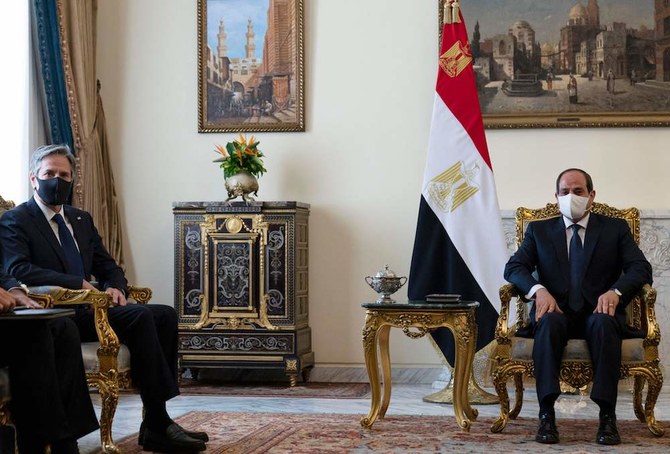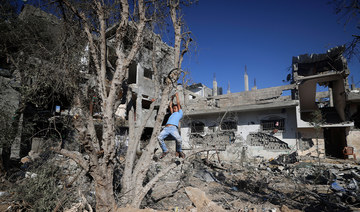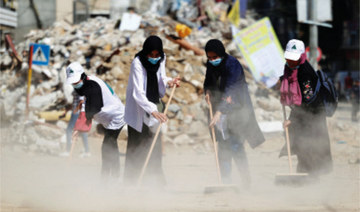CAIRO: US Secretary of State Antony Blinken jetted to Egypt on Wednesday as he pressed ahead with a diplomatic mission aimed at shoring up a cease-fire that ended an 11-day war between Israel and the Gaza Strip’s ruling Hamas militant group.
Blinken landed in Cairo a day after holding intensive talks with Israeli and Palestinian leaders. In Egypt, he met with President Abdel Fattah El-Sisi and other top officials. Later he traveled to Jordan to meet with King Abdullah II.
Blinken has vowed to “rally international support” to rebuild the destruction in hard-hit Gaza while promising to make sure that none of the aid reaches Hamas. He is instead trying to bolster Hamas’ rival, the internationally recognized Palestinian Authority.
Blinken has set modest goals for the trip, his first official visit to the Middle East as secretary of state. His main goals have been to help rebuild Gaza and lower the tensions in contested Jerusalem that helped fuel the war.
Important meeting with Egyptian President Sisi today. I conveyed President Biden’s appreciation for Egypt’s critical mediation efforts in support of a ceasefire and affirmed the strategic partnership between the United States and Egypt. pic.twitter.com/NzW83ivpAC
— Secretary Antony Blinken (@SecBlinken) May 26, 2021
But he has made it made clear the US has no immediate plans to pursue peace talks between the sides and done little to address the underlying causes of the decades-long conflict, though he expressed hope for creating a “better environment” that might lead to negotiations.
In Cairo, Blinken on Wednesday met with El-Sisi for nearly two hours. Meeting with American diplomatic staff afterwards, he described Egypt as a “real and effective partner” that helped end the Gaza war and is helping “build something positive.” El-Sisi spoke to President Joe Biden last week before and after the cease-fire was announced.
“I think we both believe strongly that Palestinians and Israelis deserve equally to, to live in safety and security to enjoy equal measures of freedom, opportunity and dignity. And we’re working on that together,” Blinken said before departing to Jordan.
El-Sisi told Blinken that the latest developments between Israelis and Palestinians reaffirmed the need for direct talks between the two sides with Washington’s involvement.
Washington and Cairo agreed to strengthen their coordination in consolidating the cease-fire and launching the reconstruction process in the Gaza Strip, the Egyptian presidency said in its statement.
Both Egypt and Jordan are key US allies that have peace agreements with Israel and frequently serve as mediators between Israel and the Palestinians. Egypt maintains ties with Hamas, but also enforces a tight blockade on Gaza, along with Israel, with a shared goal of preventing the Islamic group from arming.
The stop in Cairo, along with Biden’s phone talks with El-Sisi, signal a closer relationship between the countries after a cooler beginning, when the US expressed concern over El-Sisi’s human rights record.
The Gaza reconstruction effort will be an important test. The 11-day war killed more than 250 people, mostly Palestinians, and caused heavy destruction in the impoverished coastal territory. Preliminary estimates have put the damage in the hundreds of millions of dollars.
Blinken also said he discussed Egypt’s water needs and the importance of finding a diplomatic solution to the giant Grand Ethiopian Renaissance Dam during his meeting with El-Sisi.
Ethiopia says the hydropower dam is crucial to its economic development, and that it is asserting its rights over Nile waters long controlled by downstream countries under colonial-era agreements.
Widely arid Egypt relies on the Nile for as much as 90 percent of its fresh water.
Meanwhile, German Chancellor Angela Merkel agreed in a video call with El-Sisi that the Gaza cease-fire must be stabilized, a German government spokesman said on Wednesday.
They also agreed on the goal of supporting a resumption in political negotiations, he said.
Ahmed Aboul Gheit, secretary-general of the Arab League, said US commitment is critical for the region. Before the Gaza war, the Biden administration had kept its distance, preferring to focus on higher foreign policy priorities like China and Iran.
“In the absence of an effective role for the US, we should expect nothing but more cycles of violence and bloodshed of innocent people,” he wrote in the Saudi daily Asharq Al-Awsat.
One of the US goals is to ensure that any assistance be kept out of the hands of Hamas, which opposes Israel’s right to exist and which Israel and the US consider a terrorist group.
In Gaza, Hamas leader Yehiyeh Sinwar told journalists Wednesday that the group welcomed international reconstruction aid, as long as it did not come from Israel, and had no objections to international oversight.
“I emphasize our commitment in Hamas that we will not take a single penny earmarked for rebuilding or humanitarian issues,” he said.
Sinwar, who has close ties with the group’s armed wing, said Hamas receives ample military assistance from outside sources — led by Israel’s archenemy, Iran. “When I said we do not take money destined for aid, this is because we have comfortable sources of funds covering our activities,” he said.
He also lashed out at Blinken for trying to strengthen the Palestinian Authority at Hamas’ expense. “They are trying to add more fuel to the fire of Palestinian division,” Sinwar said.
British Foreign Secretary Dominic Raab was in Israel on Wednesday to build on the momentum of Blinken’s visit.
Echoing Blinken’s message, Raab said the UK supported Israel’s right to defend itself against Hamas rocket fire and would seek to prevent aid money from reaching Hamas. But he also expressed hope that cease-fire efforts would lead to a broader regional peace effort.
“We want to support Israel but we also want the Palestinians to find a track toward an enduring peace,” he said.
Blinken said Tuesday the US is trying to bolster the rival government of President Mahmoud Abbas, whose forces were ousted from Gaza by Hamas in 2007. Abbas’ Palestinian Authority now administers autonomous areas in the Israeli-occupied West Bank. Abbas has been largely sidelined by recent events, is deeply unpopular at home and has little influence in Gaza.
Abbas hopes to establish an independent state in all of the West Bank, Gaza and east Jerusalem — areas captured by Israel in the 1967 Mideast war.
In a gesture to the Palestinians, Blinken on Tuesday announced plans to reopen a diplomatic office in Jerusalem that oversees outreach to the Palestinians. He also pledged nearly $40 million in additional aid to the Palestinians.
In all, the Biden administration has pledged some $360 million to the Palestinians, restoring badly needed aid that the Trump administration had cut off.
The truce that ended the Gaza war on Friday has so far held, but it did not address any of the deeper issues plaguing the Israeli-Palestinian conflict. Those challenges include a hawkish Israeli leadership that seems unwilling to make major concessions, Palestinian divisions, years of mistrust and deeply rooted tensions surrounding Jerusalem and its holy sites.
The war was triggered by weeks of clashes in Jerusalem between Israeli police and Palestinian protesters in and around the Al-Aqsa Mosque, built on a hilltop compound revered by Jews and Muslims that has seen several outbreaks of Israeli-Palestinian violence over the years. The protests were directed at Israel’s policing of the area during the Muslim holy month of Ramadan and the threatened eviction of dozens of Palestinian families by Jewish settlers.
The truce remains tenuous since tensions are still high in Jerusalem and the fate of the Palestinian families is not yet resolved.
On Wednesday, an Israeli court heard arguments from a Palestinian family trying to block their eviction in Silwan, another east Jerusalem neighborhood targeted by settler groups.
“The settlers want to take my house, to steal my house with their fake papers,” said Kaet Abdel Fath El Rajabi, who said his family has lived in the building for 60 years. Several dozen protesters stood outside the courthouse in support of the family.
In his remarks after his meeting with Blinken on Tuesday, Netanyahu hardly mentioned the Palestinians, warning of a “very powerful” response if Hamas breaks the cease-fire while expressing support for economic development in the West Bank.
Blinken repeatedly affirmed what he said was Israel’s right to defend itself. But he also called on leaders of all sides to chart a “better course” in hopes of laying the groundwork for peace talks aimed at establishing an independent Palestinian state alongside Israel.
(With AP and Reuters)






















